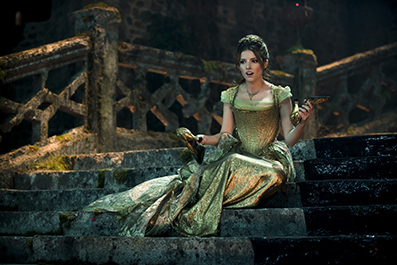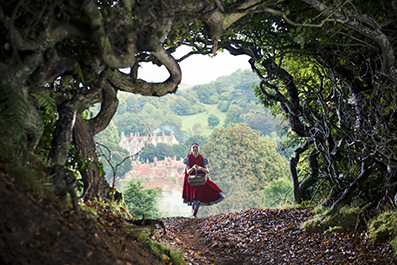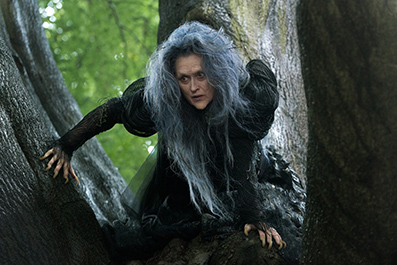"But what if he knew who you are when you know
that you're not what he thinks that he wants..." |
Cinderella, slippers stuck in the pitch on the steps of the palace. |
Unravel that line in the time you're given before the next one! Musicals are downright weird. Come on, you must have noticed. Characters talk and then suddenly for no reason save the convention of musicals, movie reality is jettisoned and the characters start singing. What's that all about? I had (and for all I know am still having) an argument with a once close friend about the genre status of Bob Fosse's Cabaret. Was it a musical? "Yes!" he said. Categorically "No!" I countered. My argument was simple. There was no 'fantasy' element to the musical numbers, a trait that unites all musicals, stage or screen. In Fosse's masterpiece, each musical element occurred as straightforward acts in the titular cabaret. No one broke out of 'movie reality' to have an emotionally revealing sing-along. Yes, the songs and acts had direct metaphorical relationships to scenes they were intercut with but that's different from being divorced from the acceptable 'reality' of a normal dramatic film. In that sense for the opening sequence alone, you could call Indiana Jones and the Temple of Doom a musical... Heresy perhaps but the reverse is true in Sondheim fan Joss Whedon's Once More With Feeling, the 'musical' Buffy episode. It was nothing of the kind. They were all under a legitimate spell in the established Buffyverse so the songs were their own reality and so it wasn't a musical by my definition... Although there was backing music but hey, that was part of the spell.

Into The Woods is a musical, no question – and a bona fide Broadway classic to boot (arcane pun intended as a giant's boot hung over the front of the theatre on its original run). But then I am as biased as it is possible to be. The original theatrical musical, which ran from 1986 to 1988 in the US (after which it turned up abroad), is a tour de force of dizzying imagination, a production seemingly full of simple musical numbers that are anything but. It's also a razor sharp dissection of inter-family relationships and parental fears of abandonment and regret. It features a hearty dose of artistic wisdom, a social conscience (of all things) and reveals itself to be a crafty and subversive take on Bruno Bettelheim's 1976 tome, 'The Uses Of Enchantment', an examination of the profound foundations of fairy tales and their psychological effect on children. My memories of the original Broadway performance are inextricably entwined with my close relationship with director Richard Franklin, a Sondheim aficionado whose friendship was the crucible in which his infectious passion for the composer/lyricist burned white hot. He got to know Sondheim personally through his relationship with one time Sondheim collaborator, Anthony Perkins, the star of Richard's Psycho II. Richard and I – by complete and startling coincidence – attended the same performance of Into The Woods in New York during the show's original run. That was some coincidence. At the time I was living in and had flown from London and he had flown in from Australia and this was well before information of our intended whereabouts was delivered via our almost daily email contact in the 90s and beyond. Into The Woods has been happily nestled into my heart ever since. How was I not going to love it? It comes, like 2nd hand Macs, pre-loved. How many movies do you see where you know 85 per cent of the dialogue and lyrics? The only sticking points were going to be the casting, performances and any cuts and changes Sondheim may have made to his own stage show music and lyrics.
Broadway musicals are forever in flux. Like Shakespeare productions, each new version is subtly or broadly different in tone and presentation to the one that preceded it. It's only movies that are usually set in crafted stone unless you're a digital tinkerer who can't keep his teeth off the terabytes. There is no such thing as a definitive theatrical musical as they're never designed to be that way. The script (aka 'the book' in the theatre) is endlessly interpretable. But make a movie... that's a different story all together even if it's the same story. You have to commit to imagery that, in its original medium, is sometimes snugly conjoured up and augmented by the audience's imagination stage wise. The London staging was a surrealist triumph with a series of doors behind which were all manner of creatures and sights. The Broadway staging was also hugely imaginative. A movie tree is usually a tree or a close facsimile of a tree on a soundstage. On stage, it can be anything or anything can stand in for a tree. Director Marshall has stayed within a comfortable level of reality. With digital effects at his disposal, the Witch comes and goes in a number of dramatic effects. Birds, once flimsy models on visible strings, are now CG creations controlled by Cinderella but the woods are the woods, no scrims or backdrops. There is a none too subtle nod to the staging of the killing of the wolf by handling the scene like the original stage directors did – the wolf as grandmother lays behind a flimsy semi-opaque curtain... A curious choice but then eating someone alive, metaphorical or not, was never going to be rendered Saw-style in this meaningful confection of a fairy tale. It's Disney after all but Disney has let Sondheim's work pass through their corporate filter with precious little alteration and for once I have to nod at the powers that be (in the Mouse House) who supported this fantastic piece of work.

The narrative of Into The Woods is a complex, interweaving tale of four principal characters, all with their own wishes and how their actions and fate in a fairytale world of Witches, princes, giants, wolves and woods (the metaphor for life and its opportunities, dangers and joys) buffet them as they collide and form new insights about themselves and their role in amongst a society of others threatened by a literal giant, powerful force. They emerge wiser and more infused with self-knowledge. The baker and his wife are the new kids on the block created by Sondheim and James Lapine, the characters entrusted to take the core emotional journey of the production. There is no doubt that the most sympathetic and entertaining character is the baker's wife. More on the performances later but for now I will simply say Emily Blunt – wow, squared. The baker and his wife's joint wishes are for a child. The Witch, neighbour of the baker whose father once stole from her, has put a spell on his family cursing them to be forever childless. The only way to lift the curse is to venture into the woods to find four objects and deliver them to the Witch. They have but three midnights to complete the task. All other characters are taken from fairytale folklore, Grimm first and foremost. Cinderella wants to go to the ball and Jack wants to keep his best fiend, a cow called Milky White, the irony being is that she produces no milk so he is forced to sell her. It's all normal fairy tale stuff, you'd think. Well, you can certainly take it that way if you like but this is Sondheim. The man is incapable of writing anorexic, one-note lyrics. His work is stuffed full of multi-interpretation, innuendo and sparkling intelligence. The baker's wife has a dalliance with a fickle but charming prince in the woods... Cheating on Cinderella, he says with devout earnestness "I was raised to be charming, not sincere," the best line of the show. How do you imply more than a chaste kiss?
"What was that?
Was that me...
Did a Prince really kiss me...
and kiss me...
and kiss me...
and did I kiss him back?"
It's simple repetition but contains a whole slew of sexual activity. Just after, the baker's wife beautifully sums up one of life's insistent dilemmas. In romance and love, it's almost always 'or' (as in one choice, one partner or another). It's never 'and' (how many people would emotionally or physically share their loved one?) I have to quote the last lines so you get what I'm so enthusiastic about... Straight after the tryst, she sings...
"Let the moment go...
Don't forget it for a moment, though.
Just remembering you've had an "and",
When you're back to "or",
Makes the "or" mean more
Than it did before.
Now I understand-
And it's time to leave the woods."
Essentially she's saying how much more she appreciates her husband and her normal life now she's had a taste of what the woods can offer despite the overwhelming but morally dubious experience. There are reasons the husband doesn't get to debate the wisdom of this but you'll have to find those out for yourself. I could blow Sondheim's trumpet for pages and pages but I won't. I'll leave my astonished appreciation of his talent at the back door of this paragraph – so many moments to choose from. Proceed to the next paragraph for the movie stuff but allow me to quote one last sublime lyric... It was excised from the movie for time's sake I imagine (as was the best pun contained in the baker's wife's line "If the end it right is justifies the beans...") The two competing princes have married their heart's desires (Act I) after competing with each other just how difficult the wooing was in the duet Agony. But like men the world over, once married, they desire more. Each prince finds another beauty in Act II... one sleeping, the other with skin as white as snow... Compare the last verses of each... Sublime.
Agony – Act I |
Agony Reprise – Act II |
[CINDERELLA'S PRINCE]
Always ten steps behind- |
[CINDERELLA'S PRINCE]
While they lie there for years- |
[RAPUNZEL'S PRINCE]
Always ten feet below- |
RAPUNZEL'S PRINCE]
And you cry on their biers- |
[BOTH]
And she's just out of reach.
Agony!
That can cut like a knife!
I must have her to wife. |
[BOTH]
What unbearable bliss!
Agony!
That can cut like a knife!
Ah well, back to my wife... |

And so to the cast: Meryl Streep plays the Witch and it's a star turn in the ensemble and what can I say? She's terrific. She can sing superbly and despite the fact that she's well into middle age, her transformation from deformed Witch to beautiful, youthful pre-Witch is entirely credible as Streep is a beautiful woman 'witch' ever way you curse it. Mamma Mia proved her singing and physical prowess and it gives the movie a cachet it would not have enjoyed without her participation (she's the poster girl, after all). At the other end of the global fame scale, (though his Broadway turns must have turned director Marshall's head) James Cordon of Gavin and Stacey fame plays the baker and he does so with admirable singing skill and a heartfelt acting style that grounds his character. I was prepared not to warm to him (I'm not a Gavin and Stacey fan, sorry to say) and he's been pilloried by the media (and inexplicably Captain Picard in public) but here, he's just wonderful, much more like his hapless dad in the Matt Smith era Doctor Whos. It's a tough role because he has to take on board news that would (in reality) demand acting with more depth and pathos but as this is a fairy tale and we have a plot to barrel through, he pitches his performance just perfectly. Johnny Depp turns up as the voracious wolf (on stage the wolf sports an overt penis, less so in the movie – I can imagine Walt spinning in his grave if the filmmakers retained this genital prop for the movie). He menaces Red Riding Hood played by Lilla Crawford (not quite as strong a presence in the movie as the other characters). I was glad to see that the hymenal blood was still part of the subtext ('red' 'riding' and 'hood' – do you need any more metaphorical names for blood, sex and genital procreation protection?) Chris (Captain Kirk/Jack Ryan) Pine and Billy Magnussen are just perfect as the two ridiculously privileged and fickle princes. Their duet on the waterfall is a highlight, one that includes clumsy competitive chest baring. As to Pine in particular, it's great to see an actor send up his own image as a macho leading man. Anna Kendrick (of Twilight fame) as Cinderella has a terrific voice and her slightly sharper beauty sets her apart from her ghastly sisters. Nice to see Tracy Ullman uglied up as Jack's impoverished and stern mother. Jack is also winningly played by (I assume) newcomer Daniel Huttlestone though he showed his promise playing Gavroche in 2012's Les Miserables. Leonard's mother in The Big Bang Theory, Christine Baranski (her turn in Mamma Mia is also notable) plays a nasty stepmother willing to mutilate her daughters feet to jam on that damn slipper, anything to thwart Cinderella's claim to the footwear.
But, as with the Broadway production, the actress playing the baker's wife gets the main plaudits. Joanna Gleeson (recently seen in the final third series of the excellent Aaron Sorkin penned The Newsroom) is just perfect in admittedly the best part of the stage ensemble. Awards just magnetically threw themselves at her for that role. She set the bar high but in the movie Emily Blunt is as charismatic, as vulnerable, as nervous and as fearful. Gleeson exploited the New York vibe at the time so her relationship with the theatre audience was more direct. There were no knowing winks but more knowing links. Blunt has no such advantage but she still walks off with the movie, Streep's powerhouse performance notwithstanding. I just have to mention actress Frances de la Tour's part in the production. Active for fifty years in the business and she's cornered the market on playing giants although her turn in Into The Woods makes her Harry Potter universe giant look David-like compared to the Goliath she plays here as a vengeful female giant hunting down Jack whose axe wielding beanstalk felling leads to the death of her husband.
Stephen Sondheim is now 84 years old. His illustrious career has enriched the artistic world to the extent that he will be hailed in the future as one of the world's greatest dramatists. Yes, the pitiable Andrew Lloyd Webber has enjoyed more financial success but if I can make a spurious comparison here, I hope it's taken lightheartedly. Sondheim is the Kubrick of musical theatre, Lloyd Webber the Spielbergian populist. Make of that what you will. Into The Woods is a superb rendition of one of his finest works. Accept the musical form, go and see Into The Woods while it's still playing and revel in what cinema can do given corporate Disney support and drink in deeply the astonishing subtext and pure humanity of his world view. Director Rob Marshall's interpretation of one of Sondheim's more popular forays into musical theatre will stand the test of time and multiple viewings. I will leave you with a final quote from the lyrics of this monumental work...
[COMPANY]
Careful the wish you make,
Wishes are children.
Careful the path they take,
Wishes come true,
Not free.
Careful the spell you cast,
Not just on children.
Sometimes the spell may last
Past what you can see
And turn against you...
[WITCH]
Careful the tale you tell.
That is the spell.
Children will listen...
I am standing, a standing ovation of one. Join me. |